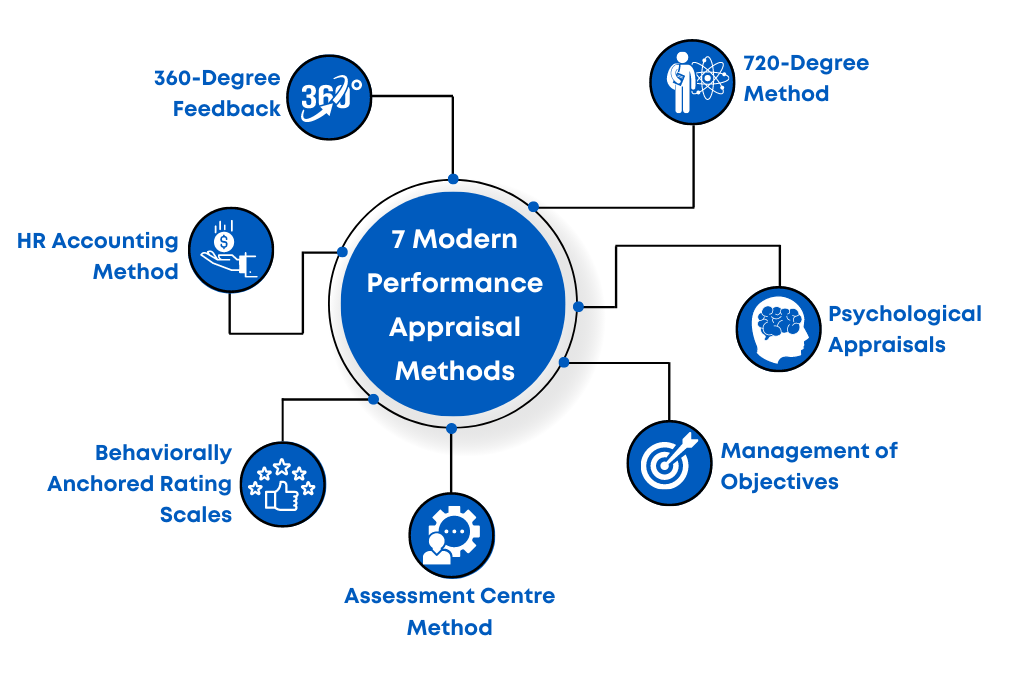‘Performance appraisal’ is a critical yet important process for companies to motivate the employee’s performance as well as their outcomes. Nowadays, the process is not limited to an employee’s promotion and/or salary increments, but also it is a good opportunity for companies to evaluate employees’ strengths and weaknesses accurately.
In business field, a wide variety of methods have been used for performance appraisal since last many years. These methods make the whole appraisal process easier and faster for HR people and managers.
Due to new-age features included in these modern tools, tracking performance of an employee becomes easier for companies. Modern methods are proving a genuine fit for today’s generation to evaluate the significance of an employee’s performance and enhance the employee’s retention rate.
Some employees have negative perceptions about the appraisal system because a feeling of being criticized in the process. So, make it complete opposite and provide employees constructive feedback.
An employee and a reviewer must focus on their tone of voice, body language and even choice of words. If needed, give your supervisors and managers a proper training to handle the appraisal process tactfully.
There are various ways companies can conduct a performance appraisal process and make it more result-oriented. Some organizations plan performance review meeting annually or half-yearly based on their company policies.
What is Performance Appraisal?
Going by its definition, the performance appraisal process or performance appraisal method is a review process of employee performance at the job and overall contribution to an organization’s success in a span of a certain time period.
This performance appraisal method is also known as “annual review,” “employee appraisal”, “employee performance assessment”, or “performance evaluation”. It evaluates an employee’s skills, accomplishments and growth or lack in performance and paves way for their improvement.
The whole process helps companies to develop a roadmap for their business for the coming future.
Also Read: 11 Key Objectives of Performance Appraisal in 2024
What is the Purpose of Performance Appraisal Method
The performance appraisal process is a win-win situation for organizations and employees. Employee evaluation is a great practice for an organization to find top performers. Also, it helps your employees to upgrade their skills and performance as they get feedback to better their own roles.
The process is very much necessary to make businesses and employees to get prepared for achieving the next milestone. Performance evaluation provides a platform to the employee to know how their performance impacts business growth.
Companies can also get an idea about good performers and poor performers so that they know whom to offer an appraisal for more productivity and who needs training sessions to boost performance. Below we explained what benefits it offers to an organization and to an employee in detail;
Benefits for Companies
- Identify departmental issues that affect work quality.
- Motivate talent of your staff to increase productivity
- Find scope of improvement in working conditions to enhance productivity.
- Help to make strategic decisions regarding expansion planning, layoffs, etc.
Benefits for Employee
- Acknowledge the accomplishments of an employee!
- Identify the opportunity for career development.
- Know where the performance is lacking.
Types of Performance Appraisal Methods
Before we move on to modern performance appraisal methods, below we listed some traditional methods of performance appraisal;
- Grading Method
- Ranking methods
- Paired comparison
- Field review method
- Essay method
- Confidential report
- Forced distribution method
- Critical incidents method
Need of Modern Appraisal Methods
Due to advanced technologies, workspaces have changed drastically and hence, offices need a better and a transparent appraisal method. Generally, traditional appraisal methods focus more on rating of individual’s personality traits, whereas the latest performance appraisal method emphasize more on an employee’s accomplishments.
The modern method is developed to overcome the flaws in old performance management techniques. With changing times, traditional performance appraisal methods prove no longer effective in yielding required results.
Instead of focusing more on future work, these old methods are based more on an employee’s past. Many employers view the whole procedure as futile! So, the majority of companies also start switching to modern methods for accurate results that companies need to excel in their fields.
On the other hand, modern methods leave a positive impact on employees about the appraisal system and now they can face the appraisal meeting with more confidence and without taking burden of it. These new processes can easily accommodate the modern demand of employers and employees. Today, companies use the latest method to make the evaluation process unbiased.
Why opt for Modern Methods of Performance Appraisal
When you know how these modern processes can beneficial for your business, then it becomes easy for you to decide which one to select. So, lets now understand how it supports your organization;
- Clearly define the company’s goals
- Improve productivity and performance of employees
- Offer effective and real-time feedback to employees
- Identify training and development requirements
- Provide insights about ineffective activities
- Align employee’s performance with the company’s vision
- Enhance employee retention and employee engagement rate
Types of Modern Performance Appraisal Methods
There are some of the employee’s performance appraisal methods that are framed taking into consideration all the contemporary aspect of modern day business workflow.
- Management by objectives mbo
- 360-degree appraisal method
- Cost accounting method
- behaviorally anchored rating scale bars
- Psychological appraisal
- Human Resource appraisal methods
List of Top 7 Modern Performance Appraisal Methods
With the correct method of performance evaluation, companies can improve productivity of their workforce and also make the whole review experience rewarding and effective. HR leaders usually implement one of the seven modern methods of performance appraisal that are listed below:

1. 360-degree Feedback
This multidimensional technique of performance appraisal evaluates an employee based on feedback gathered from his managers, customers and peers. A good method to eliminate biased reviews and to get a detailed understanding of an employee’s competence!
This modern method of performance appraisal system is also used to ascertain training and development requirements. Under 360-degree appraisal, employee related information like his or her skills, behaviors and abilities are gathered from clients, peers and supervisors.
Advantages:
- Employees are aware that their performance and its impact is monitored by other stakeholders.
- Motivate employees to invest in career development and self-development activities.
- Promote employee engagement
Disadvantages:
- Lack of planning
- Cultural differences
- Competitiveness
- Delay or misguided feedback
2. 720-degree Method
The method demands assessment of the stakeholders and also from the groups outside the company. The outside group consists of investors, clients, suppliers, etc and analyzes the success of a company as a whole. It makes the workplace synergetic and enhances productivity.
Advantages:
- It helps to analyze better and give proper feedback after measuring the performance on various elements.
- Company can build co-operative and superior team and also encourages transparency in the process.
Disadvantages:
- Majority of reviewers thinks this is the tedious method.
- Focus more on weaknesses instead of strengths.
3. Psychological Appraisals
The process is useful to identify the hidden potential of an employee and also focus more on analyzing an individual’s future performance. It analyzes employees’ performance based on various elements like intellectual traits, interpersonal skills, personality traits, cognitive abilities, leadership skills, emotional quotient, etc.
Advantages:
- Along with an employee’s performance, extract measurable data to identify employee’s potential.
- Easy to deploy and offers a platform for introverted employees to show their potential.
Disadvantages:
- The process is slow and complex.
- Need involvement of psychologist to conduct various tests.
4. Management of Objectives
In this method, staff and managers work together to identify, organize and communicate objectives to focus on. Once managers set the clear goals, then they check the progress periodically and debate over the feasibility of achieving those goals.
They validate objectives by using the SMART method and see whether the objective is clear, achievable, time-sensitive, measurable and realistic. Under this method, employees are reviewed on their results and if they succeed, then they are rewarded with salary hikes and/or promotions else they need to go through further training.
The main purpose of this review method is to aid an employee’s overall performance and not to degrade the employee. The performance evaluation process is not conducted in a punitive manner, but in a constructive manner.
Advantages:
- Improves employees’ commitment towards the business
- Increase probability for goal accomplishments
- Make employees future-ready
Disadvantages:
- Less involvement of senior management
- Un-measurable and unclear objectives
5. Assessment Centre Method
In 1930, this method was introduced and later, it has been updated to fit today’s work culture. In this method, employees know how others see them and it affects their work performance.
This process evaluates the current performance of an employee and also predicts his job performance in the future. During the evaluation, an employee is asked to participate in social-simulation activities to ensure his success in a role.
Assessment method is specially used for evaluating potential of supervisors and executives in businesses. They are reviewed by senior management and the review process is also supported by the human resource team and psychologists.
Employees need to participate in various exercises, simulations, work groups and role playing that are important for successful performance of the actual job. The reviewers discuss about the gathered information and give their feedback at the end of the appraisal meeting in terms of strengths and weaknesses of an employee.
Advantages:
- Enhance employee’s thought process and boost employee efficiency
- Tailored to fit different business needs and different roles
- Improves an individual’s personality and skills
- Minimum chance for biasedness
Disadvantages:
- Difficult to carry out!
- Cost and time intensive process
- Discourage poor performers
- Creates unhealthy competition at the workplace
6. Behaviorally Anchored Rating Scales (BARS)
Companies bring out quantitative and qualitative benefits with this modern performance appraisal process. The method involves multiple statements that describe about employee’s common behaviors. These statements help to measure performance of an individual against predefined standards which are applicable to their job profile.
The elements involved in this process offer better equitable appraisals as compared to other methods. Generally, it involves five simple steps such as generating critical incidents, developing performance dimensions, reallocating incidents, scaling incidents and developing the final BARS instrument.
The reason why this method is better than the traditional method is because it offers benefits like clearer standards, consistency, better feedback and more accurate gauge in evaluation. But, this method also involves some disadvantages.
Advantages:
- Clear standards are defined, analyze performance accurately and enhanced feedback process.
- Focus more on observable and specific behaviors instead of irrelevant variance rating.
- Eliminate chances of biased reviews and keep the process fair and transparent!
Disadvantages:
- Difficult to make decisions regarding promotion and salary increments!
- Time-consuming and demands more from seniors!
7. Human Resource Accounting Method
By using this method, companies can analyze employees’ performance through the monetary benefits they give to the organization. The method considers factors like quality, interpersonal relationships, overhead cost, etc.
Advantages:
- Accurately calculates the value employees bring to the company.
Disadvantages:
- This method is money-consuming and need good memory and strong analytical skills of the reviewer.
In a Nutshell!
Each process has its advantages and disadvantages and also you need to keep in mind that one method that suits one organization may be non-suitable for another company. After all, no method is perfect and suits all organizations to measure the performance of employees.
Selecting the right performance appraisal is also not easy as it reflects what you think of your employees’ potential and how much you are interested in their career development. But, once you identify the right method based on your industry type and employee base, then the next challenge for the human resource team is to implement it properly. This will avoid the critical performance gaps and also identify pain points that affect ROI.
Due to availability of rapid advancement in HR software, companies sideline outdated appraisal methods and prefer to invest cloud-based performance appraisal management system. The system offers the quality of results which are required for a company to optimize its growth and success.
In recent times, the technological power of HRMS software has skyrocketed. With the help of automated HRMS system, the human resource department can run the performance evaluation process in just a few minutes.
In fact, some HR software are easy to customize and integrates well with other online HR tools such as an attendance management system, leave management software, timesheet management, etc. so that you can get the clear picture of employees’ overall performance with just few clicks.
Reasons to Select the Performance Appraisal Management System of Pocket HRMS
Pocket HRMS, a new-age HR software with various built-in modules, offers a simple, customizable and user-friendly performance management platform that fulfills all your business needs.
Our HRMS modules help companies to prepare their businesses for the future of work and connect your employees with you.
- Help managers and HR folks to deliver spot-on and prompt reviews
- 540-degree feedback platform that’s ensures unbiased rewards
- Help organizations to align workforce towards company goals
- Ensure to complete all tasks involved in the performance appraisal cycle
- Easy to track and record performance of employees on regular basis
- Available with options like 90 degrees, 180 degrees, 360 degrees, and 540 degrees
- Makes the tedious task of performance appraisal stress-free and efficient
Say goodbye to traditional appraisal methods with our cloud-based performance management solution and motivate your workforce to explore their hidden talents!
Remember, the process of performance evaluation shapes the performance and productivity of your business.
So, investing in the right solution that provides a reliable and transparent platform to recognize employees’ dedication and hardships is very important!
Follow us to keep yourself up to date with the latest HR templates, content, and tips! To contact Pocket HRMS, simply you can reach us here, at sales@pockethrms.com to book a free demo of our cloud-based HRMS Software.








